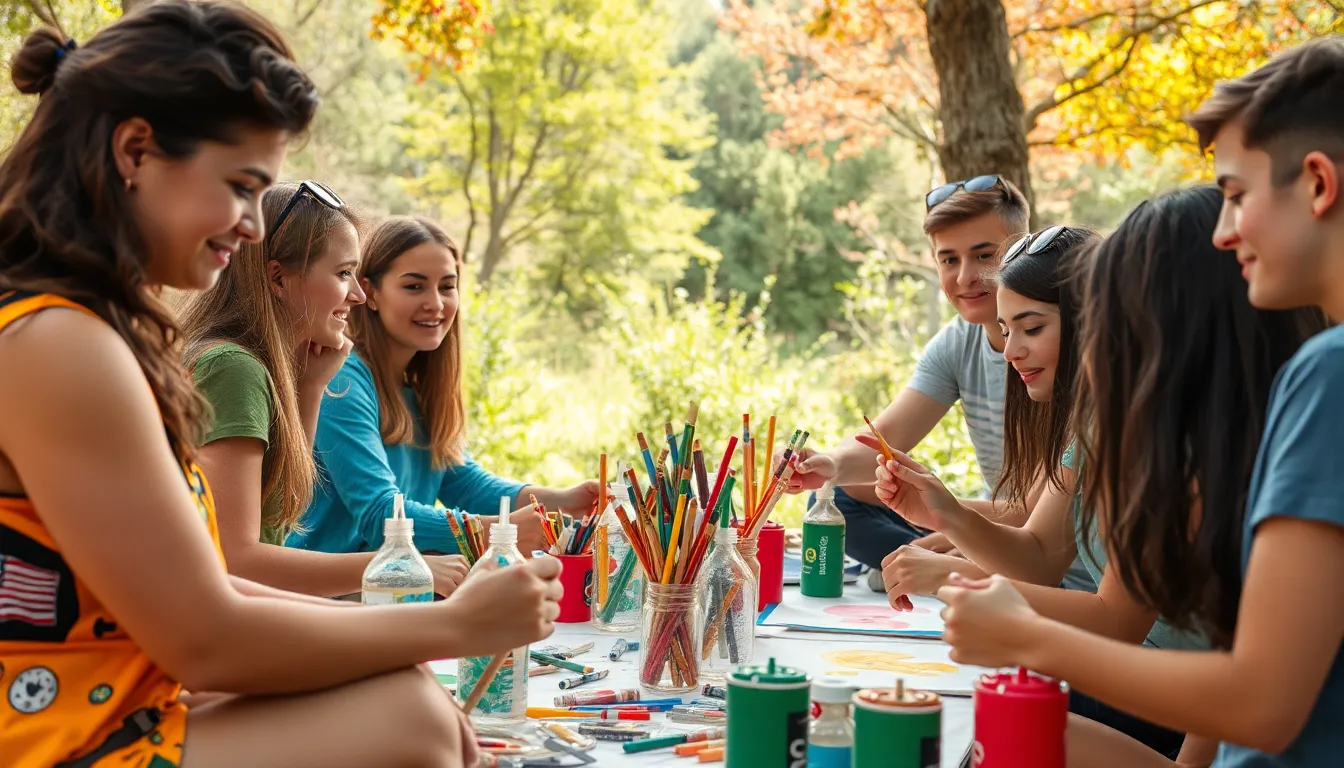In a world where TikTok dances and meme culture reign supreme, youth mental wellness often gets overshadowed. Yet, it’s crucial for young minds to thrive amidst the chaos of social media and academic pressures. Think of mental wellness as the Wi-Fi connection of life—without it, everything just feels a bit sluggish and disconnected.
So, how can they boost their mental health without resorting to a bubble bath and scented candles? Fear not! This article dives into practical, engaging strategies that’ll have them feeling like rock stars in no time. From mindfulness techniques that make meditation feel less like a chore to social activities that don’t involve awkward small talk, there’s something here for everyone. Let’s explore these youth mental wellness strategies that not only uplift spirits but also sprinkle a little fun into the journey of self-care.
Table of Contents
ToggleUnderstanding Youth Mental Wellness
Youth mental wellness encompasses emotional, psychological, and social well-being. This state includes how young individuals think, feel, and act in daily life. Mental wellness influences thoughts and emotions, impacting academic performance and relationships.
Pressures from social media often heighten mental distress among youth. Constant comparisons to idealized images can lead to feelings of inadequacy and anxiety. Educational demands can further compound these feelings, creating a volatile environment for emotional health.
An understanding of youth mental wellness requires attention to common mental health issues. Anxiety disorders affect roughly 31.9% of young people aged 13 to 18. Depression also poses significant risks, with about 13% of youth experiencing at least one episode before reaching adulthood. Addressing these issues is crucial for fostering resilience.
Implementing supportive strategies plays a vital role in promoting youth mental wellness. Encouraging open conversations about emotions can create safe spaces for sharing feelings. Incorporating activities such as exercise, art, and music promotes emotional expression and stress relief.
Furthermore, teaching mindfulness techniques enhances self-awareness. Practices like deep breathing, meditation, and yoga help ground thoughts when overwhelmed. Engaging in social activities fosters connection and support, improving overall well-being.
By prioritizing approaches that resonate with youth, communities can strengthen mental wellness initiatives. Tailoring resources to meet specific needs enhances relevance and effectiveness. Lastly, combining education with practical support equips young individuals to navigate challenges successfully.
Importance of Mental Wellness Strategies

Implementing mental wellness strategies plays a crucial role in supporting youth in today’s fast-paced environment. Strategies positively influence young people’s emotional and psychological health.
Benefits for Youth
Youth experience various benefits from effective mental wellness strategies. These strategies lead to improved emotional resilience, allowing young individuals to better handle stress. Enhanced communication skills arise when youth engage in open conversations about their emotions. Active involvement in activities like exercise, art, and music fosters emotional expression, leading to a deeper understanding of personal feelings. Furthermore, encouraging practices like mindfulness helps cultivate awareness, contributing to reduced anxiety levels. About 31.9% of young people face anxiety disorders, showcasing the urgency for intervention. Prioritizing these mental wellness strategies proves essential for navigating challenges.
Impact on Overall Development
Mental wellness strategies significantly impact overall development among youth. Strong emotional health directly correlates to improved academic performance, with engaged students displaying higher focus and motivation. Social relationships benefit as well, with effective communication leading to healthier connections with peers and adults. Resilient individuals are more likely to embrace challenges and setbacks, fostering personal growth. Communities can aid development by offering resources that address specific needs and encourage participation in mental wellness initiatives. Given that around 13% of youth experience depression before adulthood, focusing on mental well-being becomes imperative for fostering a thriving future.
Effective Youth Mental Wellness Strategies
Implementing effective strategies supports youth mental wellness in a challenging environment. The following methods enhance mental health among young individuals.
Mindfulness and Meditation
Practicing mindfulness helps youth manage stress and develop self-awareness. Techniques like deep breathing and guided meditation create a calming effect during overwhelming moments. Studies indicate that mindfulness can reduce anxiety symptoms by 30% in adolescents. Incorporating short daily sessions boosts focus and emotional regulation. Engaging in mindfulness activities promotes a habit of self-reflection, leading to healthier responses to stressors.
Physical Activity and Exercise
Regular exercise significantly improves mental wellness for young people. Physical activity releases endorphins, which enhance mood and reduce feelings of anxiety. Engaging in team sports or solo workouts encourages a sense of accomplishment. Research shows that about 60 minutes of moderate exercise three to five times a week correlates with lower depression rates. Building exercise routines increases resilience and fosters overall well-being.
Healthy Social Connections
Nurturing strong social connections supports youth in navigating emotional challenges. Positive relationships provide a safety net for expressing feelings and seeking support. Encouraging participation in group activities fosters teamwork and encourages communication skills. Youth with at least one close friendship experience about 50% lower levels of stress and loneliness. Building a supportive network creates an environment where young people feel valued and understood.
Creative Expression
Engaging in creative activities fosters emotional resilience and understanding. Art, music, and writing allow youth to express feelings that may be difficult to articulate. Participation in creative outlets can reduce anxiety and depression symptoms significantly. Creating visual art or playing an instrument offers a therapeutic way to process emotions. Encouraging exploration in creativity cultivates self-confidence and provides meaningful outlets for stress relief.
Role of Parents and Educators
Parents and educators play pivotal roles in fostering youth mental wellness. By creating a supportive environment, they can significantly impact young people’s emotional well-being.
Supporting Youth Through Communication
Open communication is essential for youth mental health. Encouraging conversations about feelings helps build trust between adults and young individuals. Asking questions and actively listening show that adults value young people’s experiences. In 2019, research indicated that youth who engage in dialogue about their emotions exhibit lower levels of anxiety. Youth need to feel safe discussing their struggles, which allows for deeper connections. Conversations about mental wellness should be normalized at home and in schools to promote emotional understanding. Frequent check-ins also provide opportunities to express feelings and challenges.
Encouraging Positive Environments
Creating positive environments enhances youth mental wellness. Parents and educators can cultivate spaces free from judgment where young people can thrive. Celebrating successes, whether academic or personal, boosts young people’s self-esteem and motivation. Foster collaboration and teamwork in educational settings, helping youth develop social connections. Participating in group activities, such as clubs or sports, strengthens bonds and creates enjoyable experiences. In 2021, studies revealed that supportive home and school environments correlate with better emotional health outcomes. Practicing empathy and understanding promotes resilience among youth. This balance allows young people to feel valued and encourages healthy emotional development.
Prioritizing youth mental wellness is essential in today’s challenging environment. By implementing effective strategies like mindfulness exercise and open communication, young individuals can develop resilience and emotional strength. These practices not only enhance mental health but also improve academic performance and social relationships.
Creating supportive environments at home and in schools plays a crucial role in fostering positive mental health. When parents and educators engage in meaningful conversations about emotions, they empower youth to express themselves and seek help when needed.
Investing in youth mental wellness initiatives can lead to healthier communities where young people thrive, navigate challenges, and build a brighter future.




